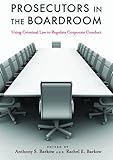Prosecutors in the Boardroom : Using Criminal Law to Regulate Corporate Conduct / ed. by Rachel E. Barkow, Anthony S. Barkow.
Material type: TextPublisher: New York, NY : New York University Press, [2011]Copyright date: ©2011Description: 1 online resourceContent type:
TextPublisher: New York, NY : New York University Press, [2011]Copyright date: ©2011Description: 1 online resourceContent type: - 9780814787038
- 9780814709375
- 345.730268 23
- KF9351 .P76 2016
- online - DeGruyter
| Item type | Current library | Call number | URL | Status | Notes | Barcode | |
|---|---|---|---|---|---|---|---|
 eBook
eBook
|
Biblioteca "Angelicum" Pont. Univ. S.Tommaso d'Aquino Nuvola online | online - DeGruyter (Browse shelf(Opens below)) | Online access | Not for loan (Accesso limitato) | Accesso per gli utenti autorizzati / Access for authorized users | (dgr)9780814709375 |
Frontmatter -- Contents -- Acknowledgments -- Introduction -- 1. The Causes of Corporate Crime: An Economic Perspective -- 2. Deferred Prosecution Agreements on Trial: Lessons from the Law of Unconstitutional Conditions -- 3. Removing Prosecutors from the Boardroom: Limiting Prosecutorial Discretion to Impose Structural Reforms -- 4. Potentially Perverse Effects of Corporate Civil Liability -- 5. Inside-Out Enforcement -- 6. The Institutional Logic of Preventive Crime -- 7. Collaborative Organizational Prosecution -- 8. The Prosecutor as Regulatory Agency -- 9. What Are the Rules If Everybody Wants to Play? Multiple Federal and State Prosecutors (Acting) as Regulators -- 10. Reforming the Corporate Monitor? -- Conclusion -- Contributors -- Index
restricted access online access with authorization star
http://purl.org/coar/access_right/c_16ec
Who should police corporate misconduct and how should it be policed? In recent years, the Department of Justice has resolved investigations of dozens of Fortune 500 companies via deferred prosecution agreements and non-prosecution agreements, where, instead of facing criminal charges, these companies become regulated by outside agencies. Increasingly, the threat of prosecution and such prosecution agreements is being used to regulate corporate behavior. This practice has been sharply criticized on numerous fronts: agreements are too lenient, there is too little oversight of these agreements, and, perhaps most important, the criminal prosecutors doing the regulating aren’t subject to the same checks and balances that civil regulatory agencies are. Prosecutors in the Boardroom explores the questions raised by this practice by compiling the insights of the leading lights in the field, including criminal law professors who specialize in the field of corporate criminal liability and criminal law, a top economist at the SEC who studies corporate wrongdoing, and a leading expert on the use of monitors in criminal law. The essays in this volume move beyond criticisms of the practice to closely examine exactly how regulation by prosecutors works. Broadly, the contributors consider who should police corporate misconduct and how it should be policed, and in conclusion offer a policy blueprint of best practices for federal and state prosecution.Contributors: Cindy R. Alexander, Jennifer Arlen, Anthony S. Barkow, Rachel E. Barkow, Sara Sun Beale, Samuel W. Buell, Mark A. Cohen, Mariano-Florentino Cuellar, Richard A. Epstein, Brandon L. Garrett, Lisa Kern Griffin, and Vikramaditya Khanna
Mode of access: Internet via World Wide Web.
In English.
Description based on online resource; title from PDF title page (publisher's Web site, viewed 06. Mrz 2024)


